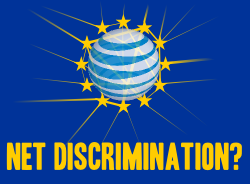Behind closed doors, positions are being negotiated on the Telecoms Package among the rapporteur, the European Commission, and the Council of the EU. If those “trialogues” get to a compromise, it will simply be put to votes as a whole in committees instead of the amendments tabled in the Parliament. This opaque process is disturbing in itself, but the content of the compromise is even worse. Once again some powerful parties are fighting against equal access.

In the March 25 documents (attached below), rapporteur Malcolm Harbour proposes positions on “net discrimination” that are tightly linked to the ones pushed by AT&T and the UK government.
They claim that when operators discriminate against competitors and other players by content, applications, or services over the Internet, this is merely a consumer issue to be resolved by competition law − not a fundamental matter of equal access. They say it is unimportant to keep the Internet a neutral zone where people have equal access to all legal players, content, and services. Their position is that the big players should be free to maximize their profits by discriminating against others for their convenience; and that when something goes wrong, consumers can try to have it corrected afterwards.
Competition law is fundamentally ineffective in the face of such practices because it fails to prevent them, and acts too late when harm is done and cannot be corrected, as demonstrated by cases such as mobile operators’ discrimination over Internet access and roaming fees, or Microsoft’s grip over European IT systems.
It is better never to catch the disease than to hope to cure it after becoming infected, time after time after time.
Should we imagine that the big Internet players will suddenly and spontaneously behave better than they have done until now? They have already shown that they don’t, and now they want their discriminatory business practices written into law. The UK government is pushing this
position.
This way of giving in to AT&T and the UK government fools nobody: if operators agree on such discriminatory policies, as the mobile operators do in most European Countries − forbidding the use of peer-to-peer, voice over IP, or streaming on their so-called mobile “Internet” access − consumer information will be able to change nothing.
Discrimination in Internet access would poison innovation, stifle the economic growth of information societies, and damage civil liberties. The regulator must intervene when those are threatened.
Citizens must inform members of IMCO committee about those issues, before the vote on March 31st.

